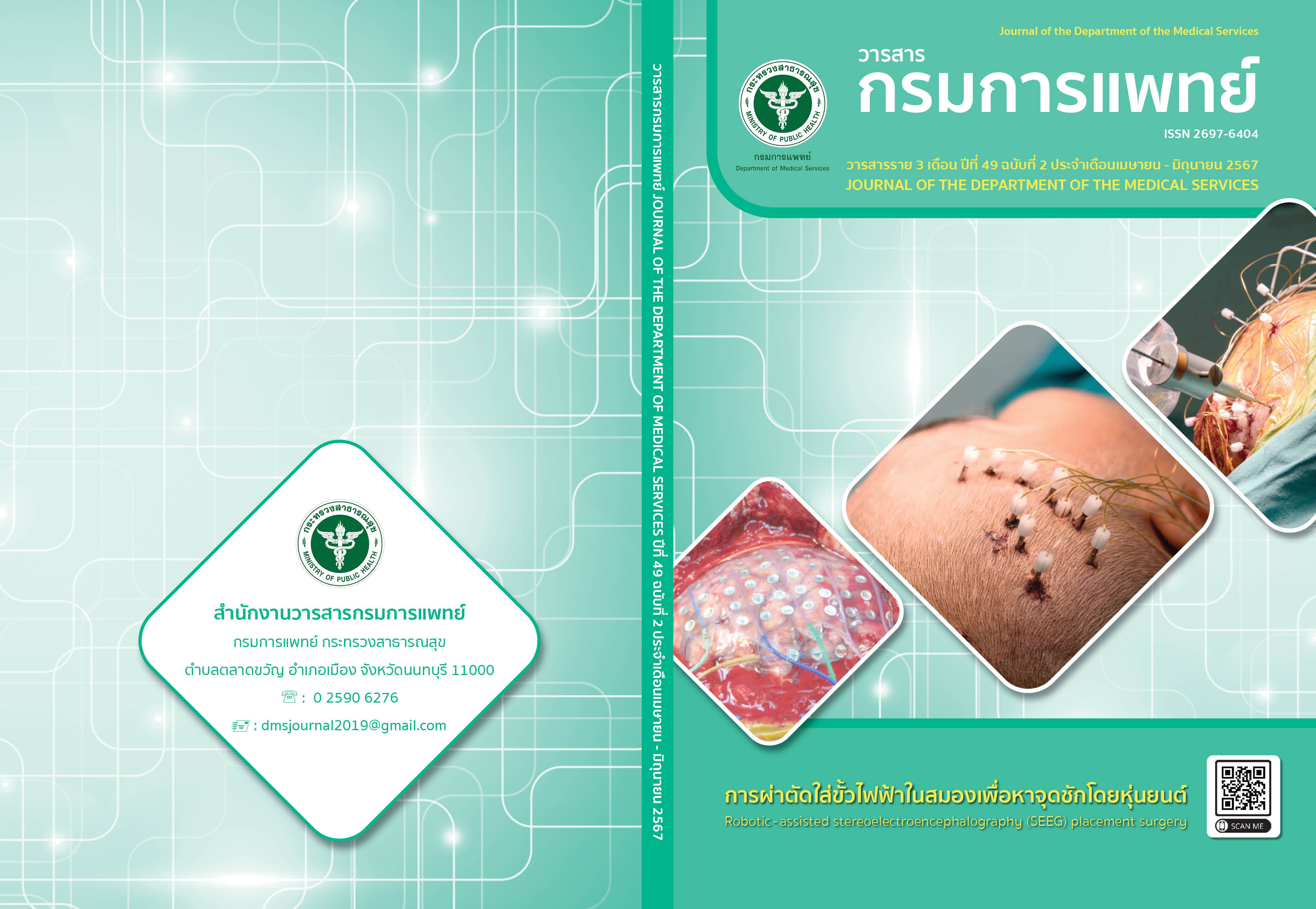การศึกษาภาวะการรู้คิดในผู้ป่วยเสพติดสารโอปิออยด์ที่มารับการรักษาด้วยเมทาโดนระยะยาว สถาบันบำบัดรักษาและฟื้นฟูผู้ติดยาเสพติดแห่งชาติบรมราชชนนี
คำสำคัญ:
ภาวะการรู้คิด, เมทาโดนระยะยาว, ผู้ป่วยเสพติดสารโอปิออยด์บทคัดย่อ
ภูมิหลัง: ผู้ป่วยเสพติดสารโอปิออยด์ที่มารับการ รักษาด้วยเมทาโดนระยะยาวนับเป็นหนึ่งวิธีการดูแล ผู้ป่วยกลุ่มนี้ไม่ให้กลับไปใช้ยาเสพติดซ้ำ ยาเสพติดทุกชนิดส่งผลต่อสมองและภาวะการรู้คิดของผู้ป่วย หากเกิดความบกพร่องทางการรู้คิดจะส่งผลต่อประสิทธิภาพในการรักษา และคุณภาพชีวิตของผู้ป่วยได้ วัตถุประสงค์: เพื่อศึกษาภาวะ การรู้คิดของผู้ป่วยเสพติดสารโอปิออยด์ที่มารับการรักษาด้วยเมทาโดนระยะยาวที่ไม่ใช้โอปิออยด์ซ้ำเทียบกับกลุ่มที่ใช้โอปิออยด์ซ้ำที่มารับการรักษาที่ Harm Reduction Center ณ สถาบันบำบัดรักษาและฟื้นฟูผู้ติดยาเสพติดแห่งชาติบรมราชชนนี วิธีการ: เป็นการศึกษาเชิงวิเคราะห์แบบภาคตัดขวาง กลุ่มตัวอย่างคือผู้ป่วยเสพติดโอปิออยด์ที่มารับการรักษาด้วยเมทาโดนระยะยาวในกลุ่มที่ไม่ใช้โอปิออยด์ซ้ำจำนวน 40 ราย และกลุ่มที่ใช้โอปิออยด์ซ้ำจำนวน 42 ราย เครื่องมือที่ใช้ในการวิจัย คือ แบบสอบถามลักษณะส่วนบุคคล แบบประเมินอาการซึมเศร้าของเบคฉบับภาษาไทย และแบบประเมินภาวะบกพร่องทางการรู้คิดฉบับภาษาไทย เก็บข้อมูลระหว่างเดือนมกราคม - มิถุนายน 2566 วิเคราะห์ข้อมูลด้วยโปรแกรมคอมพิวเตอร์ นำเสนอข้อมูลแจงนับด้วยสถิติเชิงพรรณนา จำนวน ร้อยละ ค่าเฉลี่ย และส่วนเบี่ยงเบนมาตรฐาน ข้อมูลเชิงวิเคราะห์ใช้สถิติวิเคราะห์เปรียบเทียบ chi-square, Fisher’s exact test และ independent t-test ส่วนข้อมูลที่มีการแจกแจงไม่ปกติ ใช้สถิติ Mann - Whitney U test กำหนดค่านัยสำคัญทางสถิติที่ระดับ .05 ผล: ไม่พบความแตกต่างของคะแนนเฉลี่ยทางการรู้คิดในกลุ่มผู้ป่วยที่ใช้โอปิออยด์ซ้ำและกลุ่มที่ไม่ใช้โอปิออยด์ซ้ำอย่างมีนัยสำาคัญทางสถิติ เมื่อแบ่งตามช่วงอายุ พบว่า ผู้ป่วยกลุ่มที่ใช้โอปิออยด์ซ้ำในช่วงอายุ 20 - 29 ปี มีคะแนนเฉลี่ยทางการรู้คิดต่ำกว่ากลุ่มที่ไม่ใช้ โอปิออยด์ซ้ำ และพบว่าปัจจัยทางด้านอายุมีความสัมพันธ์กับความบกพร่องทางการรู้คิดในกลุ่มผู้ป่วยที่ไม่ใช้โอปิออยด์ซ้ำ อย่างมีนัยสำคัญทางสถิติที่ระดับ .05 สรุป: การคัดกรองภาวะการรู้คิดของผู้ป่วยเสพติดสารกลุ่มโอปิออยด์ที่มารับการรักษา ด้วยเมทาโดนระยะยาวเป็นเรื่องสำคัญโดยเฉพาะในผู้ป่วย กลุ่มอายน้อยกว่า 30 ปีที่ใช้โอปิออยด์ซ้ำ เพื่อเป็นข้อมูลในการ วางแผนการรักษาผู้ป่วยแต่ละรายให้เกิดประสิทธิภาพสูงสุด
เอกสารอ้างอิง
Alexander K, Pogorzelska-Maziarz M, Gerolamo A, Hassen N, Kelly EL, Rising KL, et al. The impact of COVID-19 on healthcare delivery for people who use opioids: a scoping review. Subst Abuse Treat Prev Policy 2021;16(1):1-10.
Degenhardt L, Peacock A, Colledge S, Leung J, Grebely J, Vickerman P, et al. Global prevalence of injecting drug use and sociodemographic characteristics and prevalence of HIV, HBV, and HCV in people who inject drugs: a multistage systematic review. Lancet Glob Health 2017;5(12):e1192-e207.
New Policy And Planning Bureau. Protective performance and solve drug problems during the fiscal year 1998-2000 (October 1997-September 2000). Bangkok : Office of the Nacrotics Control Board; 2020.
World Health Organization. Guidelines for the psychosocially assisted pharmacological treatment of opioid dependence. Geneva : World Health Organization; 2009.
Nosyk B, Li L, Evans E, Urada D, Huang D, Wood E, et al. Utilization and outcomes of detoxification and maintenance treatment for opioid dependence in publicly-funded facilities in California, USA: 1991-2012. Drug Alcohol Depend 2014;143:149-57.
Ball JC, Lange WR, Myers CP, Friedman SR, Behavior S. Reducing the risk of AIDS through methadone maintenance treatment. J Health Soc Behav 1988;29(3):214-26.
Marsch LA. The efficacy of methadone maintenance interventions in reducing illicit opiate use, HIV risk behavior and criminality: a meta-analysis. Addiction 1998;93(4):515-32.
Bell J, Hall W, Byth K. Changes in criminal activity after entering methadone maintenance. Br J Addict 1992;87(2): 251-8.
Gibson DR, Flynn NM, McCarthy JJ. Effectiveness of methadone treatment in reducing HIV risk behavior and HIV seroconversion among injecting drug users. AIDS 1999;13(14):1807-18.
Order of the Land Forces Center Overcome the National Drug Abuse No. 19/2556 regarding the Action Plan of the Land Force to Defeat Drugs in 2014 [internet]. Bangkok : Narcotics Control Management Center, Ministry of Public Health; 2014 [cited 2022 Jan 22]. Available from: http://www.yasothon. go.th/web/Yaso_fles/images/ Zoneya/Master07.pdf.
angGY, Wouldes TA, Russell BR. Methadone maintenance treatment and cognitive function: a systematic review. Curr Drug Abuse Rev 2013;6(3):220-30.
Patrakorn A, Sumranthiwawan W, Boonchaipanitwatthana S, Lapinee T, Ngamkhajornwiwat A, Ukranan W, et al. Standard treatment of methadone maintenance treatment in Thailand. Bangkok: Chulalongkorn Univesity Printring House; 2015.
Baldacchino A, Balfour DJ, Matthews K. Impulsivity and opioid drugs: differential effects of heroin, methadone and prescribed analgesic medication. Psychol Med 2015;45(6):1167-79.
Mintzer MZ, Copersino ML, Stitzer ML. Dependence A. Opioid abuse and cognitive performance. Drug Alcohol Depend 2005;78(2):225-30.
Mazhari S, Keshvari Z, Sabahi A, Mottaghian S. Assessment of cognitive functions in methadone maintenance patients. Addict Health 2015;7(3-4):109-16.
Brorson HH, Ajo Arnevik E, Rand-Hendriksen K, Duckert F. Drop-out from addiction treatment: a systematic review of risk factors. Clin Psychol Rev 2013;33(8):1010-24.
Motazedian S, Solat N, Banihashem SS, Kheradmand A, Mohammadi SD, Chalakinia N. Cognitive function in methadone maintenance patients compared with abstinent opioid users. J Addict Dis 2021;39(4):537-44.
Miller AK, Alston RL, Corsellis JA. Variation with age in the volumes of grey and white matter in the cerebral hemispheres of man: measurements with an image analyser. Neuropathol Appl Neurobiol 1980;6(2):119-32.
Darke S, McDonald S, Kaye S, Torok M. Comparative patterns of cognitive performance amongst opioid maintenance patients, abstinent opioid users and non-opioid users. Drug Alcohol Depend 2012;126(3):309-15.
Baldacchino A, Armanyous M, Balfour DJ, Humphris G, Matthews K. Neuropsychological functioning and chronic methadone use: a systematic review and meta-analysis. Neurosci Biobehav Rev 2017; 73:23-38.
Gruber SA, Marisa MS, Yurgelun-Todd DA. Neuropsychological consequences of opiate use. Neuropsychol Rev 2007;17(3):299-315.
Donovan DM, Kivlahan DR, Kadden RM, Hill D. Cognitive impairment as a client treatment matching hypothesis. In: Longabaugh R, Wirtz PW, editors. Project MATCH hypotheses: results and causal chain analyses. Maryland: National Institute on Alcohol Abuse and Alcoholism; 2001, p. 62-81
Teichner G, Horner MD, Roitzsch JC, Herron J, Thevos A. Substance abuse treatment outcomes for cognitively impaired and intact outpatients. Addict Behav 2002;27(5):751-63.
Severtson SG, von Thomsen S, Hedden SL, Latimer W. The association between executive functioning and motivation to enter treatment among regular users of heroin and/or cocaine in Baltimore, MD. Addict Behav 2010;35(7):717-20.
Li W, Li Q, Wang Y, Zhu J, Ye J, Yan X, et al. Methadone-induced damage to white matter integrity in methadone maintenance patients: a longitudinal self-control DTI study. Sci Rep 2016;6:19662.
ดาวน์โหลด
เผยแพร่แล้ว
รูปแบบการอ้างอิง
ฉบับ
ประเภทบทความ
สัญญาอนุญาต
ลิขสิทธิ์ (c) 2024 กรมการแพทย์ กระทรวงสาธารณสุข

อนุญาตภายใต้เงื่อนไข Creative Commons Attribution-NonCommercial-NoDerivatives 4.0 International License.
บทความที่ได้รับการตีพิมพ์เป็นลิขสิทธิ์ของกรมการแพทย์ กระทรวงสาธารณสุข
ข้อความและข้อคิดเห็นต่างๆ เป็นของผู้เขียนบทความ ไม่ใช่ความเห็นของกองบรรณาธิการหรือของวารสารกรมการแพทย์



